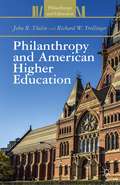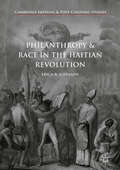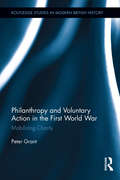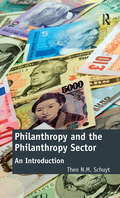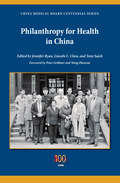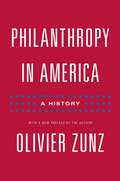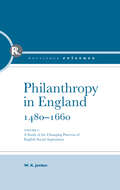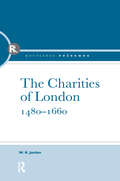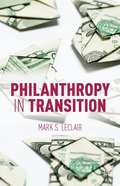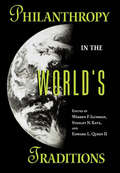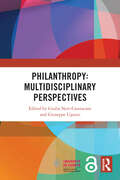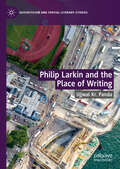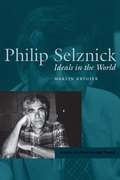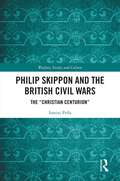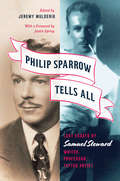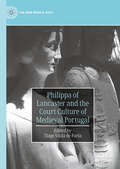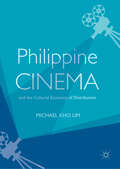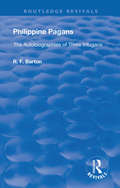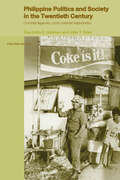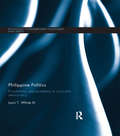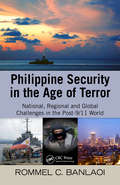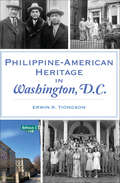- Table View
- List View
Philanthropy and American Higher Education
by John R. Thelin Richard W. TrollingerPhilanthropy and American Higher Education provides higher education professionals, leaders and scholars with a thoughtful, comprehensive introduction to the scope and development of philanthropy and fund raising as part of the essential life and work of colleges and universities in the United States.
Philanthropy and Race in the Haitian Revolution (Cambridge Imperial and Post-Colonial Studies Series)
by Erica R. JohnsonThis book examines the ways in which a minority of primarily white, male, French philanthropists used their social standing and talents to improve the lives of peoples of African descent in Saint-Domingue during the crucial period of the Haitian Revolution. They went to great lengths to advocate for the application of universal human rights through political activities, academic societies, religious charity, influence on public opinion, and fraternity in the armed services. The motives for their benevolence ran the gamut from genuine altruism to the selfish pursuit of prestige, which could, on occasion, lead to political or economic benefit from aiding blacks and people of color. This book offers a view that takes into account the efforts of all peoples who worked to end slavery and establish racial equality in Saint-Domingue and challenges simplistic notions of the Haitian Revolution, which lean too heavily on an assumed strict racial divide between black and white.
Philanthropy and Voluntary Action in the First World War: Mobilizing Charity (Routledge Studies in Modern British History)
by Peter GrantThis book challenges scholarship which presents charity and voluntary activity during World War I as marking a downturn from the high point of the late Victorian period. Charitable donations rose to an all-time peak, and the scope and nature of charitable work shifted decisively. Far more working class activists, especially women, became involved, although there were significant differences between the suburban south and industrial north of England and Scotland. The book also corrects the idea that charitably-minded civilians’ efforts alienated the men at the front, in contrast to the degree of negativity that surrounds much previous work on voluntary action in this period. Far from there being an unbridgeable gap in understanding or empathy between soldiers and civilians, the links were strong, and charitable contributions were enormously important in maintaining troop morale. This bond significantly contributed to the development and maintenance of social capital in Britain, which, in turn, strongly supported the war effort. This work draws on previously unused primary sources, notably those regarding the developing role of the UK’s Director General of Voluntary Organizations and the regulatory legislation of the period.
Philanthropy and the Construction of Victorian Women's Citizenship
by Andrea Geddes PooleBritish social reformers Emma Cons (1838-1911) and Lucy Cavendish (1841-1924) broke new ground in their efforts to better the lot of the working poor in London: they hoped to transform these people's lives through great art, music, high culture, and elite knowledge. Although they did not recognize it as such, their work was in many ways an affirmation and display of citizenship. This book uses Cons's and Cavendish's partnership and work as an illuminating point of departure for exploring the larger topic of women's philanthropic campaigns in late Victorian and Edwardian society.Andrea Geddes Poole demonstrates that, beginning in the late 1860s, a shift was occurring from an emphasis on charity as a private, personal act of women's virtuous duty to public philanthropy as evidence of citizenly, civic participation. She shows that, through philanthropic works, women were able to construct a separate public sphere through which they could speak directly to each other about how to affect matters of significant public policy - decades before women were finally granted the right to vote.
Philanthropy and the Philanthropy Sector: An Introduction
by Theo N.M. SchuytOffering an introduction to modern philanthropy with regard to the commitment and willingness of citizens, funds, churches and businesses to contribute voluntarily to society Philanthropy and the Philanthropy Sector: An Introduction attempts to map philanthropy and promote a better understanding of its characteristics and features. After years of division in welfare state debates between the role and responsibilities of government and the market a renewed focus on philanthropy has shown that many societies also harbour an important and growing voluntary sector. Something special is happening at the macro-societal level as the traditional government-market dyad is being broken by a renewed interest in this ’third way’. Intended for students, scientists, administrators, policymakers, politicians, fundraisers, philanthropists and philanthropic organizations this book adopts a social policy approach to look at philanthropy alongside other social arrangements and provide an invaluable introduction for all those interested in this fascinating social mechanism.
Philanthropy for Health in China
by Jennifer Ryan Lincoln C. Chen Anthony J. SaichDrawing on the expertise of Chinese and Western academics and practitioners, the contributors to this volume aim to advance the understanding of philanthropy for health in China in the 20th century and to identify future challenges and opportunities. Considering government, NGO leaders, domestic philanthropists, and foreign foundations, the volume examines the historical roots and distinct stages of philanthropy and charity in China, the health challenges philanthropy must address, and the role of the Chinese government, including its support for Government Organized Non-Governmental Organizations (GONGOs). The editors discuss strategies and practices of international philanthropy for health; the role of philanthropy in China's evolving health system; and the prospects for philanthropy in a country beginning to engage with civil society.
Philanthropy in America: A History - Updated Edition (Politics and Society in Modern America #103)
by Olivier ZunzHow philanthropy has shaped America in the twentieth centuryAmerican philanthropy today expands knowledge, champions social movements, defines active citizenship, influences policymaking, and addresses humanitarian crises. How did philanthropy become such a powerful and integral force in American society? Philanthropy in America is the first book to explore in depth the twentieth-century growth of this unique phenomenon. Ranging from the influential large-scale foundations established by tycoons such as John D. Rockefeller, Sr., and the mass mobilization of small donors by the Red Cross and March of Dimes, to the recent social advocacy of individuals like Bill Gates and George Soros, respected historian Olivier Zunz chronicles the tight connections between private giving and public affairs, and shows how this union has enlarged democracy and shaped history.Demonstrating that America has cultivated and relied on philanthropy more than any other country, Philanthropy in America examines how giving for the betterment of all became embedded in the fabric of the nation's civic democracy.
Philanthropy in England, 1480 - 1660: A study of the Changing Patterns of English Social Aspirations
by W. K. JordanThis study documents a momentous shift which occurred in men's aspirations for their society in the course of the sixteenth and seventeenth centuries. The author has examined gifts and bequests left for charitable causes over a period of nearly two centuries. in ten English counties, in order to assess the changing pattern of social aspirations and observe the different 'velocities of change' among the several social classes. Professor Jordan examines the problem of poverty in the early modern world and discusses the various measures taken by the Tudors and Stuarts to deal with the needs of the poor. He concludes that poverty was principally relieved by an immense outpouring of charitable wealth. This wealth flowed principally from an urban aristocracy determined not only to care for the hopelessly destitute but so to enlarge the 'area of opportunity' so that poverty could be prevented. At the same time, the Elizabethan law of charitable uses marshalled this generous wealth into effective agencies. The study closes with a full assessment of the noble achievements of the period: the founding of a widespread and effective system of education, the establishment of almshouses in all parts of England, and extraordinairy adn fertile experiments with the several agencies of social rehabilitation. The author records in this voluma a great and enduring historical achievement; he records as well the triumph of the secular preoccupations of mankind. This book was first published in 1959.
Philanthropy in England: A Study Of The Changing Patterns Of English Social Aspirations (Routledge Library Editions)
by W. K. JordanIn these works Professor Jordan studies the origins of modern social and cultural institutions in England. He is concerned with the momentous shift which occurred in men's aspirations for their society in the course of the sixteenth and seventeenth centuries, as reflected in the charities which were established by gifts and bequests. In a fascinating account of the measures taken by the Tudors and Stuarts to deal with the problem of poverty, Jordan concludes that it was principally dealt relieved by an immense outpouring of charitable wealth.
Philanthropy in England: A Study Of The Changing Patterns Of English Social Aspirations (Routledge Library Editions)
by W. K. JordanIn these works Professor Jordan studies the origins of modern social and cultural institutions in England. He is concerned with the momentous shift which occurred in men's aspirations for their society in the course of the sixteenth and seventeenth centuries, as reflected in the charities which were established by gifts and bequests. In a fascinating account of the measures taken by the Tudors and Stuarts to deal with the problem of poverty, Jordan concludes that it was principally dealt relieved by an immense outpouring of charitable wealth.
Philanthropy in Transition
by Mark S. LeclairPhilanthropy in Transition examines the rising importance of new channels of giving, from purchase made from social market enterprises to social impact investing. While these movements extend the reach and appeal beyond traditional philanthropy, the result is a widening distance between donor and recipient that raises new challenges.
Philanthropy in the World's Traditions (Philanthropic and Nonprofit Studies)
by Warren F. Ilchman Stanley N. Katz Edward L. Queen IIA study of global giving. “The provocative information challenges the assumptions that philanthropy is a primarily Western or Christian tradition.” —ChoiceThis book is an investigation of how cultures outside the Western tradition understand philanthropy and how people in these cultures attempt to realize “the good” through giving and serving. These essays study philanthropy in Buddhist, Islamic, Hindu, Jewish, and Native American religious traditions and in cultures from Latin America, Eastern Europe, the Middle East, Africa, and Asia.Contributors include Steven Feierman, John A. Grim, Leona Anderson, Ananda W. P. Guruge, G. D. Bond, Leslie S. Kawamura, Said Amir Arjomand, Joanna F. Handlin Smith, Mary Evelyn Tucker, Derek J. Penslar, Amanda Porterfield, Miroslav Ružica, Mark Juergensmeyer, Darrin M. McMahon, Gregory C. Kozlowski, Adele Lindenmeyr, Vivienne Shue, Andrés A. Thompson, Leilah Landim.“The cross-cultural understandings this book provides can do much to help us determine the distinctive shape and form American religious philanthropy might take in the future.” —Christian Century
Philanthropy: Multidisciplinary Perspectives (Routledge Research Companions in Business and Economics)
by Giulia Neri-Castracane and Giuseppe UgazioPhilanthropy Multidisciplinary Perspectives is a reference for academics and professionals engaged in philanthropy. It brings together scholars from fields such as economics, finance, law, philosophy, and sociology, showcasing the power of a multidisciplinary approach in providing a comprehensive view of this complex subject.The book addresses foundational questions in philanthropy and is divided into four parts. The first part asks the crucial question of why philanthropy matters, exploring the motivations behind giving and how beneficiaries are selected. The second part looks at the interaction between business and philanthropy. It examines the rise of social enterprises, the shift toward purpose-driven businesses, and the evolution of corporate social responsibility into sustainable enterprises. This part also addresses tax considerations that impact philanthropy's ability to scale. The book explores the synergies between finance and philanthropy to foster sustainable development and how philanthropy is addressing or could address specific SDGs. It concludes with key ingredients for good governance in philanthropy.The book tackles major challenges, such as diversity, compensation, and data management, while tracing the evolution of best practices in foundation governance. It identifies areas for improvement and discusses the relationships between governance in philanthropic organizations and important issues such as trust, equality, and democracy.The Open Access version of this book, available at http://www.taylorfrancis.com, has been made available under a Creative Commons Attribution-Non Commercial-No Derivatives (CC BY-NC-ND) 4.0 license.
Philip Larkin and the Place of Writing (Geocriticism and Spatial Literary Studies)
by Ujjwal Kr. PandaThis book extensively investigates the integral nature of spatiality and spatial imagination in the works of Philip Larkin. It addresses Larkin's idea of space and place, both private and public, and reflects upon his early fictional works as well as poems. To do so, the book also emphasizes the essential spatiality of modern British literature with suitable examples from other great poets of the early 20th century modernist movement, including T.S. Eliot, W.B. Yeats, W.H. Auden, and Dylan Thomas. By including detailed analysis of many unpublished poems and his early fictions, the book aspires to be a comprehensive study of Larkin's oeuvre and thus examines how Larkin's sense of place changed as he developed as a writer, starting with Brunette Coleman novels and going on to High Windows. Featuring suitable references from his biographies and letters, the book will examine Larkin's works in relation to a number of relevant ideas from the interdisciplinary spheres of literature, geography and Spatial Humanities.
Philip Selznick: Ideals in the World
by Martin KrygierPhilip Selznick's wide-ranging writings engaged with fundamental questions concerning society, politics, institutions, law, and morals. Never confined by a single discipline or approach, he proved himself a major figure across a range of fields including sociology, organizations and institutions, leadership, political science, sociology of law, political theory, and social philosophy. This volume, the first book-length treatment of Selznick's ideas, discusses Selznick's various intellectual contributions. Reading across Selznick's work, one appreciates the coherence of his fundamental preoccupations-with the social conditions for frustration and the vindication of values and ideas. Exploring Selznick's insights into the nature and quality of institutional, legal, and social life, the book also examines his particular ways of thinking, concerns, values, and sensibility. Martin Krygier brings to light the coherence of Selznick's fundamental preoccupations, allowing readers to fully engage with his unique insights and distinctive moral-intellectual sensibility.
Philip Skippon and the British Civil Wars: The "Christian Centurion" (Warfare, Society and Culture)
by Ismini PellsPhilip Skippon was the third-most senior general in parliament’s New Model Army during the British Civil Wars. A veteran of European Protestant armies during the period of the Thirty Years’ War and long-serving commander of the London Trained Bands, no other high-ranking parliamentarian enjoyed such a long military career as Skippon. He was an author of religious books, an MP and a senior political figure in the republican and Cromwellian regimes. This is the first book to examine Skippon’s career, which is used to shed new light on historical debates surrounding the Civil Wars and understand how military events of this period impacted upon broader political, social and cultural themes.
Philip Sparrow Tells All
by Samuel Steward Jeremy Mulderig Justin SpringSamuel Steward (1909-93) was an English professor, a tattoo artist for the Hells Angels, a sexual adventurer who shared the considerable scope of his experiences with Alfred Kinsey, and a prolific writer whose publications ranged from scholarly articles to gay erotica (the latter appearing under the pen name Phil Andros). Perhaps his oddest authorial role was as a monthly contributor between 1944 and 1949 to the Illinois Dental Journal, an obscure trade publication for dentists, where writing as Philip Sparrow he produced a series of charming, richly allusive, and often quirky essays on a wildly eclectic assortment of topics. In Philip Sparrow Tells All, Jeremy Mulderig has collected thirty of these engaging but forgotten columns, prefacing them with revealing introductions that relate the essays to people and events in Steward's life and to the intellectual and cultural contexts in which he wrote during the 1940s. In these essays we encounter such famous friends of Steward as Gertrude Stein, André Gide, and Thornton Wilder. We hear of his stint as a holiday sales clerk at Marshall Field's (where he met and seduced fellow employee Rock Hudson), of his roles as an opera and ballet extra in hilariously shoddy costumes, of his hoarding tendencies, his disappointment with the drabness of men's fashions, and his dread of turning forty. We go along with him to a bodybuilding competition and a pet cemetery, and together we wander the boulevards of Paris and the alleys of Algiers. Throughout, Mulderig's entertaining annotations explain the essays' wide-ranging allusions and also highlight their gay subtext, which constituted a kind of private game that Steward played with his mostly oblivious audience of Midwestern dentists. The first collection of any of Samuel Steward's writings to be republished since his death in 1993, Philip Sparrow Tells All makes these lost essays available to a broad readership that Steward imagined but never actually enjoyed when he wrote them. In doing so, it takes a major step toward documenting his important place in twentieth-century gay literature and history.
Philippa of Lancaster and the Court Culture of Medieval Portugal (The New Middle Ages)
by Tiago Viúla de FariaThis contributed volume focuses on Philippa Plantagenet (1360–1415), queen of Portugal for almost three decades, and the complexion of the court. Chapters thoroughly examine the Portuguese royal court in the few decades around the turn of the fourteenth century, a period rich in intellectual innovations throughout Europe and of dramatic changes in Portugal. The book aims to showcase current research from innovative scholars of medieval Portugal, including both established and emerging academics. It offers a comprehensive appraisal of the processes of transfer, assimilation, and exchange experienced at the royal court of later medieval Europe under given conditions of patronage and direction. This is accomplished through a multidisciplinary and comparative framework that takes together the history, architecture, music, art, and literature of the Portuguese royal court and the involvement of Philippa as queen-consort.
Philippine Cinema and the Cultural Economy of Distribution
by Michael Kho LimThis book explores the complex interplay of culture and economics in the context of Philippine cinema. It delves into the tension, interaction, and shifting movements between mainstream and independent filmmaking, examines the film distribution and exhibition systems, and investigates how existing business practices affect the sustainability of the independent sector. This book addresses the lack or absence of Asian representation in film distribution literature by supplying the much-needed Asian context and case study. It also advances the discourse of film distribution economy by expounding on the formal and semi-formal film distribution practices in a developing Asian country like the Philippines, where the thriving piracy culture is considered as ‘normal,’ and which is commonly depicted and discussed in existing literature. As such, this will be the first book that looks into the specifics of the Philippine film distribution and exhibition system and provides a historical grounding of its practices.
Philippine Pagans: The Autobiographies of Three Infugaos (Routledge Revivals)
by R.F BartonPublished in 1938, this book contains the autobiographies of Ngidulu, Bugan Nak Manghe and Kumiha, three tribespeople from the Ifuagos province in the Phillippines. A fascinating ethnological and anthropological resource, Barton, a celebrated scholar on the Philippines shares with the reader his long term study of three Ifugao natives. With a final essay on an Ifugao liberal, this book provides an observation on Phillippine pagan tribal life and culture in the early 20th century.
Philippine Politics and Society in the Twentieth Century: Colonial Legacies, Post-Colonial Trajectories (Politics in Asia)
by Eva-Lotta E. Hedman John T. SidelThe only book length study to cover the Philippines after Marco's downfall, this key title thematically explores issues affecting this fascinating country, throughout the last century. Appealing to both the academic and non academic reader, topics covered include:national level electoral politicseconomic growththe Philippine Chineselaw and orderoppositionthe Leftlocal and ethnic politics.
Philippine Politics: Possibilities and Problems in a Localist Democracy (Routledge Contemporary Southeast Asia Series)
by Lynn T. White IIIPhilippine political history, especially in the twentieth century, challenges the image of democratic evolution as serving the people, and does so in ways that reveal inadequately explored aspects of many democracies. In the first decades of the twenty-first century the Philippines has nonetheless shown gradual socioeconomic "progress". This book provides an interpretive overview of Philippine politics, and takes full account of the importance of patriotic Philippine factors in making decisions about future political policies. It analyses whether regional and local politics have more importance than national politics in the Philippines. Discussing cultural traditions of patronism, it also examines how clan feuds localize the state and create strong local policies. These conflicts in turn make regional and family-run polities collectively stronger than the central state institution. The book goes on to explore elections in the Philippines, and in particular the ways in which politicians win democratic elections, the institutionalized role of public money in this process, and the role that media plays. Offering a new interpretive overview of Philippine progress over many decades, the author notes recent economic and political changes during the current century while also trying to advance ideas that might prove useful to Filipinos. Presenting an in-depth analysis of the problems and possibilities of politics and society in the Philippines, the book will be of interest to those researching Southeast Asian Politics, Political History and Asian Society and Culture.
Philippine Security in the Age of Terror: National, Regional, and Global Challenges in the Post-9/11 World
by Rommel BanlaoiAs the twelfth most populous nation, the Philippines diverse religious and ethnic population makes it an ideal example of the changing tenet of what is deemed national security post 9/11. Issues previously considered social or public are now viewed as security issues. Food production is now analyzed in the context of food security and environmenta
Philippine-American Heritage in Washington, D.C. (American Heritage)
by Erwin R. TiongsonJourney into the Philippine-American experience in Washington, DC. Washington is famed for its place in the history of the United States, but few know its close connections with the Philippines. Trace the intertwined histories of the two countries along the streets of Washington, from the end of the Spanish American War in 1898 through Philippine independence in 1946, and the many years since. West Potomac Park was inspired by Manila's Luneta, and District streets are named after pivotal Philippine battle grounds. These landmarks are often unmentioned in guidebooks. Hidden in plain sight are the stories of the fascinating figures that once inhabited these spaces. Professor and community historian Erwin Tiongson offers a first account of the city's Philippine heritage.
Philosemitism in History
by Jonathan Karp Adam SutcliffeToo often philosemitism, the idealization of Jews and Judaism, has been simplistically misunderstood as merely antisemitism in sheep's clothing. This book takes a different approach, surveying the phenomenon from antiquity to the present day, and highlighting its rich complexity and broad impact on Western culture. Philosemitism in History includes fourteen essays by specialist historians, anthropologists, literary scholars and scholars of religion, ranging from medieval philosemitism, to such modern and contemporary topics as the African American depiction of Jews as ethnic role models, the Zionism of Christian evangelicals, pro-Jewish educational television in West Germany, and the current fashion for Jewish kitsch memorabilia in contemporary East-Central Europe. An extensive introductory chapter offers a thorough and original overview of the topic. The book underscores both the endurance and the malleability of philosemitism, drawing attention to this important, yet widely neglected, facet of Jewish - non-Jewish relations.
